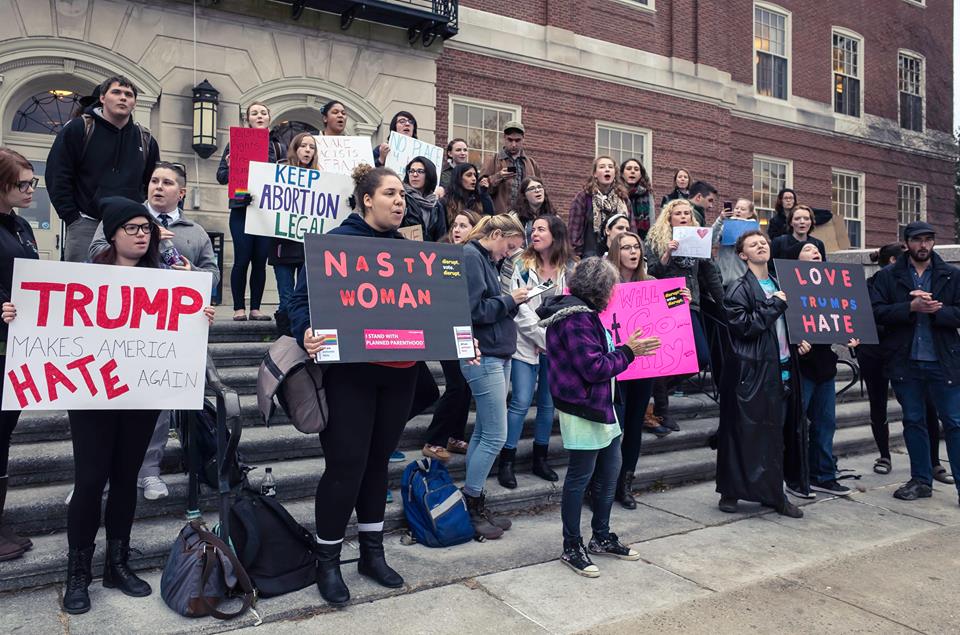On the afternoon of Tuesday, Nov. 15, the University of Maine saw two protests located in front of Fogler Library. The first was a protest for Standing Rock, an American Indian reservation in North and South Dakota currently fighting against the proposed Dakota Access Pipeline, a $3.7 billion investment to move domestic crude oil through four states.
The second was a protest as part of a national walkout movement called “Stop Trump.” Supporters of all levels gathered in hopes of having their voices heard and to advocate their beliefs.
The Standing Rock Protest started in front of the library at 12 p.m. The protest included a group of students standing in solidarity with the Standing Rock people and in opposition of the national Dakota Access Pipeline project. The plan was introduced in 2014 and the project would run through and destroy sacred lands of the Standing Rock Sioux Tribe’s Reservation, an action which has angered people in their community. In recent months, the pipeline and protests have garnered national attention as thousands of protesters continuously gather in the reservation in attempt to block the 1,200-mile project.
Theophilos Fitanides, a third-year Art student at UMaine, believes the United States is abusing its power by proposing the Dakota Access Pipeline.
“It is a situation where the United States allows the abuse of minorities and the continued thieving of native land and wilderness for the industrial ruining of the surrounding wildlife,” Fitanides said.
Fitanides mentioned that he has plans to travel to Standing Rock in the spring to join the official protest. “I’m trying to do what I can to try to make a difference. I believe as a member of society, I need to play my part.”
Amber Hathaway, a doctoral student in physics, considers the idea of the pipeline being constructed through sacred lands and without the consent of the tribes “outrageous.” She noted that the violence tribal members are facing for their protesting efforts is one of the many reasons she participated in the Orono protest. “I went to stand in solidarity with the protesters at Standing Rock,” Hathaway said.
Hathaway added that the timing of the protest was perfect.
“A lot of people were crossing the mall to change classes or grab lunch while we were out there, and so we were able to get a fair amount of attention,” Hathaway said.
Hathaway believes President Obama has some power in shutting down the Dakota Access Pipeline, but it’s unlikely that he will.
One hour after the Standing Rock protesters stepped down from the Fogler Library steps, new protesters gathered in front of the building to fight back against new President-elect Donald Trump. Hathaway also participated in the Trump protest for its duration, which lasted from 2 p.m. to 3 p.m.
“I participated because Trump’s administration poses a huge threat to equality. I’m worried that Trump’s commitment to appointing anti-choice justices not just to the Supreme Court, but also to the lower courts, that play a crucial part in the judicial process,” Hathaway said.
The protest featured students of all backgrounds holding up signs and screaming phrases such as “Love Trumps Hate,” “Nasty Woman” and “P—- Grabs Back,” all in opposition to crude remarks Trump made during his presidential campaign against women and people of color.
Hathaway stated that she is worried that her friends who are currently studying in the United States on visas could face harassment and that her friends in the LGBTQ community could face new-found discriminations under a Trump presidency. She added that if individuals come together and fight against the hate and vitriol, it will be harder for politicians and fellow citizens to take away individual rights or discriminate.
“For me, the protest was a very powerful experience. It felt good to come together with fellow equality minded people and channel the fear, anger, and sadness that we’ve been feeling in the wake of the election into something productive,” Hathaway said.
“I’m a huge proponent of nonviolent resistance,” she continued. “Historical record has shown how effective collective action can be, so I see these protests as essential and hopefully as signifying the beginnings of a larger movement toward equality,” Hathaway explained.
She hopes that in the future, the University of Maine community will build momentum in tough times and “keep up a good fight.”
Sam Wheeler, a third-year journalism major, was drawn into the Trump protest after coming out of the library around 2:30 p.m. and hearing people yelling.
“I didn’t have a ton of interest in joining [the protest],” Wheeler stated. “I don’t particularly care for Trump, and I don’t support much of what he has said or done. But, he’s our president, and we have to rally around him now. We have to back him, even Obama emphasized that when talking about the president-elect,” he added.
Wheeler noted that it’s possible for more “Stop Trump” protests to occur on the Orono campus. He added that it is still the early stages of the post-election fallout and that there are many students frustrated over the situation.
“They weren’t harming anyone by the looks of it, so the more power to them.”













